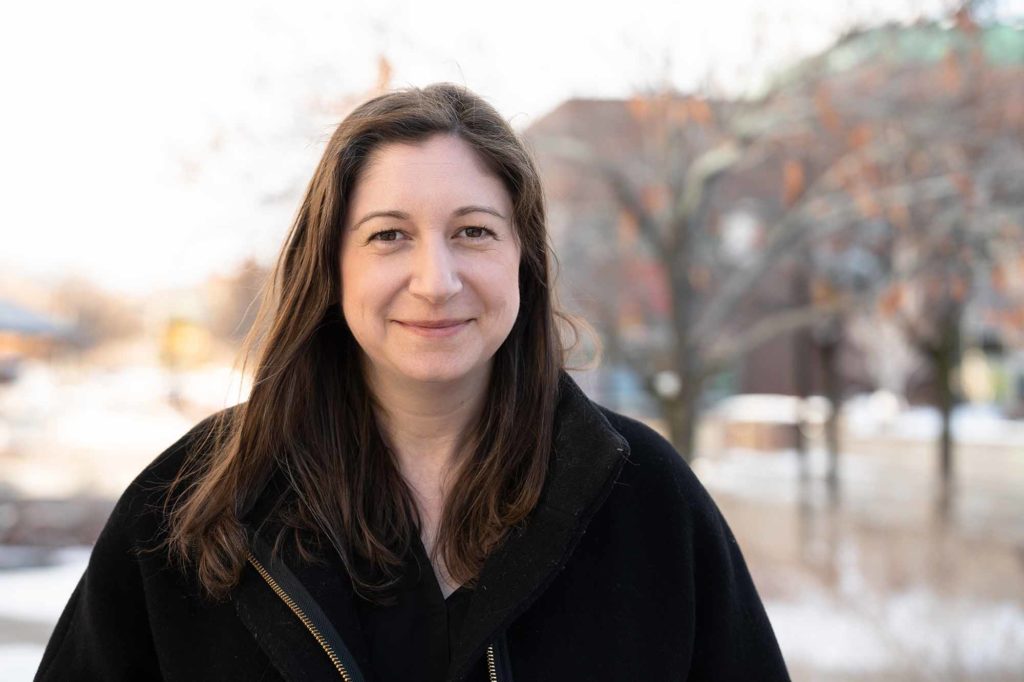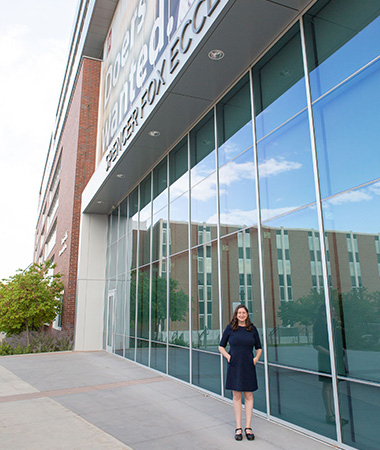First Person
Careers Up Close: Elizabeth Tenney on Power of Voice, Tenuous Funding, and Applying Psychology in Business School

Image above: Elizabeth Tenney, University of Utah
Elizabeth Tenney is an associate professor of management in the David Eccles School of Business at the University of Utah. She studies overconfidence and biases that influence our social interactions and the decisions we make.
Current role: Associate professor of management, David Eccles School of Business, University of Utah, 2022–present
Previously: Assistant professor of management, David Eccles School of Business, University of Utah, 2014–2022; postdoctoral scholar, UC Berkeley Haas School of Business, 2011–2014
Terminal degree: PhD in psychology, University of Virginia, 2011
Recognized as an APS Rising Star in 2016
Collaborative beginnings • Overcoming funding challenges • From overconfidence to the power of voice • Learning by doing • Words of advice
Collaborative beginnings
After graduating from the University of Virginia in 2011, with Bobbie Spellman as my PhD advisor, I did a postdoc at UC Berkeley’s Haas School of Business in the Management of Organizations group until 2014, working primarily with Don Moore. In graduate school, Bobbie had promoted the idea that psychology was useful, and thinking about the intersections of psychology and organizational behavior was a fun new challenge.

I tend to think back on each period of my life with rose-colored glasses, but I remember feeling like everyone at Berkeley was friendly, cared about the environment, and rode bikes through flower-lined streets. Between management, marketing, and psychology, every day there was a talk I wanted to go to. The research community was so alive. This was also the era where the open science movement was just getting its legs, and Journal Club, led by Leif Nelson every Friday, was mind blowing. That is really the term for it. A group of graduate students and professors would meet for one hour and discuss an empirical research article. Before attending these meetings, I would read the article and think, “Wow, I wish I’d thought of that cool research topic. Too bad they just used an undergrad sample.” (In those days, that was the most damning critique—that researchers only ran studies with psychology majors.) And then I would learn the real deadly sins of research practices (e.g., low power, extreme p-hacking). After Journal Club, we would go get a couple of drinks and keep talking, because realizing how prevalent these questionable research practices were and how to respond to that new knowledge was a lot to process! It all had a lasting influence on how I do science today.
After finishing my postdoc, I applied to positions in both psychology and in management departments, but I remember feeling that I was maybe a little too “business-y” for psychology and a little too “psychology-y” for business. I am lucky and grateful to have found a great fit where I am with colleagues who value both disciplines. After my experience at UC Berkeley’s Journal Club, I stayed interested in how the field was improving. In fact, I recently agreed to be a senior editor at Collabra: Psychology, where a coauthor, Simine Vazire, is editor-in-chief. It is a mission-driven, open-access journal that does not block articles behind a paywall in efforts to be in line with the scientific ideals of transparency and sharing ideas.
Check out APS’s open access journal, Advances in Methods and Practices in Psychological Science.
Overcoming funding challenges
The biggest challenge in my research career came after my second year in my postdoc. My contract said that I could do a third year, contingent on my advisor’s approval, but the fine print also said that the business school was not obligated to renew the contract. Don said he’d be thrilled if I stayed, so the job market came and went without my having applied anywhere. But I then learned from the associate dean that the school was not prepared to fund that third year for reasons that were never made clear to me.
Fortunately, this story has a happy ending. After discussions with the Union of Postdocs and Academic Researchers, the school paid half of my salary, and Don was able to fund the other half from a grant that he had. From there, I got more involved in the Good Judgment Project, which aims to improve intelligence analysis and policy decisions with respect to predicting geopolitical events. As part of the grant, I was able to research whether overconfidence can be mitigated by training or team collaboration. I also learned a valuable lesson that postdoc funding is often tenuous. Thanks to the help of the union and Don’s grant, I got to keep my postdoc, and I even received backpay for raises that I should have been getting each year but wasn’t.
From overconfidence to the power of voice
Before I began working with Don, I realized that his group had different perspectives from mine. He and Cameron Anderson et al. had just published a paper touting the benefits of overconfidence, but my collaborators and I (including Bobbie Spellman) had published papers essentially saying that self-knowledge—being well-calibrated—was better than overconfidence. It made me nervous about my postdoc—who are these people who think overconfidence is so great? But it actually blossomed into a research project where we tried to understand why we had these different findings, which was ultimately published in the Journal of Personality and Social Psychology in 2019 and translated for practitioners in Harvard Business Review. What eventually solved the discrepancy was realizing that my colleagues and I had been manipulating overconfidence using verbal statements, whereas Don and his colleagues had been manipulating it using nonverbal behavior, allowing for plausible deniability. And it was especially fun because a chapter written by a professor whom I knew from my undergraduate institution, Colgate University, was instrumental in advancing the theoretical side of reconciling the discrepancy.
I’m still interested in whom people listen to and decide to believe, but my focus has broadened to include people who might not have the confidence or standing to speak up. One example is my research on amplification of voice—endorsing others’ ideas while giving due credit. This research shows that people who have lower status in groups, maybe because they are newer to the organization or because of their gender, can gain status by helping the group recognize valuable contributions (amplifying others) or when another member amplifies them.
My research has further expanded to include issues about employee voice, which is speaking up with ideas to improve the group or organization. I love this topic because it is about credibility, confidence, influence, and status while tackling an important applied problem. I have also been examining other issues around employee voice and gender and race. For instance, I am studying the negative impact of workplace hostility on women and racially minoritized workers, as well as specific actions leaders can take to mitigate these harms. Ultimately, if early findings hold up, this work could provide compelling empirical evidence that leaders should promote civility and inclusion in workplace settings.
Learning by doing
I am a firm believer in learning by doing. Just as my mentors taught me, I have students jump in and actively participate in all parts of research, regardless of their level (undergraduate or graduate) without trying to come up with special side projects or busy work. We focus on what the project needs. I also send students a document that I think is helpful for setting expectations about communication, authorship, how to interpret feedback, and staying up on the latest best practices in science. The document stresses that we are committed to finding and disseminating truth above self-interest.
Words of advice
Here’s my main piece of advice to psychology graduates who are considering business school: Learn the ways that management, marketing, entrepreneurship, and industrial/organizational psychology are different from each other so that you know where you would best fit. Early on, I made a mistake when I applied for a marketing postdoc. In the application, I described my interest in studying employee well-being and information exchange. I was clearly talking about management topics, but I was applying to a marketing department, and though I was successful at getting other postdoc offers, I definitely did not get that one. Think carefully about your research interests so you can focus your job-hunting efforts effectively.
As for landing a job in a business school, my best practical advice—though I recognize that this is easier said than done—is to get published in a journal that business schools are familiar with and value but may still be in your wheelhouse, such as Organizational Behavior and Human Decision Processes, Journal of Applied Psychology, or Harvard Business Review. I had published a review article in the journal Research on Managing Groups and Teams that I think helped me.
Finally, for students who are applying to graduate school, please consider the PhD program at the David Eccles School of Business (Organizational Behavior track) in Salt Lake City! We value rigorous research, take mentoring seriously, and have a record of students placing well after graduating.
Feedback on this article? Email apsobserver@psychologicalscience.org or login to comment. Interested in writing for us? Read our contributor guidelines.





APS regularly opens certain online articles for discussion on our website. Effective February 2021, you must be a logged-in APS member to post comments. By posting a comment, you agree to our Community Guidelines and the display of your profile information, including your name and affiliation. Any opinions, findings, conclusions, or recommendations present in article comments are those of the writers and do not necessarily reflect the views of APS or the article’s author. For more information, please see our Community Guidelines.
Please login with your APS account to comment.